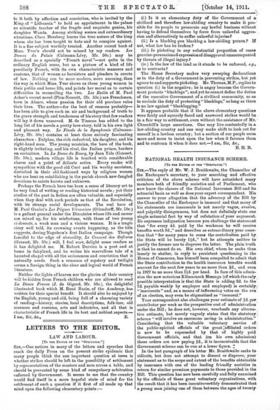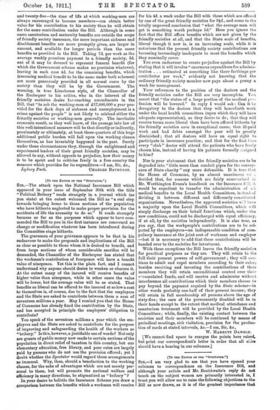NATIONAL HEALTH INSURANCE SCHEME. [To THE EDITOFI OF THE "SPECT•TOR."1
Snt,—The reply of Mr. W. J. Braithwaite, the Chancellor of the Exchequer's secretary, to your searching and effective criticism of the above scheme will have astonished many members both of friendly societies and of Parliament, who now know the clauses of the National Insurance Bill and its actuarial basis as well as does your expert correspondent. His answer to your allegation that the advocacy of the Bill by the Chancellor of the Exchequer is immoral and that many of his statements are inaccurate is not merely vague, evasive, and palpably disingenuous, but does not definitely state one single actuarial fact by way of refutation of your argument. He expresses indignation because you challenge the statement that "for every 4d. paid by the workman he will receive benefits worth 9d.," and describes as extraordinary your asser- tion that "for many years to come the contribution paid by the State will be barely Dd.," but he attempts neither to justify the former nor to disprove the latter. The plain truth is that he cannot do so. His own chief, whom he seeks thus lamely to shelter, in reply to persistent questioning in the House of Commons, has himself been compelled to admit that the State contribution to the health insurance benefits would amount for the next few years to no more than id., and even in 1927 to no more than 10. per head. In face of this admis- sion the now notorious Kilmarnock Message (of which the only possible interpretation is that the State is adding 2d. to the 7d. payable weekly by employer and employed) is certainly " inaccurate " and, as a means of influencing votes on the eve of an election, may even be stigmatized as "immoral."
Your correspondent also challenges your estimate of %Id. per contributor per week as the prospective cost of administration under the Bill ; he does not, however, vouchsafe any alterna- tive estimate, but merely vaguely states that the statutory scheme "will involve an enormous saving in administration." Considering that the valuable voluntary service of the public-spirited officials of the great :affiliated orders is now to be superseded by that of highly paid Government officials, and that (on his own admission) these orders are now paying V., it is inconceivable that the Government scheme can be run at a lower figure. ...-
In the last paragraph of his letter Mr. Braithwaite seeks to ridicule, but does not attempt to dissect or disprove, your statement as to the scope and extent of the benefits obtainable by insurance with one of the leading friendly societies in return for similar premium payments to those provided in the Bill. This question has now been carefully and fully examined by the officials of these great voluntary organizations, with the result that it has been incontrovertibly demonstrated that a young man joining one of them between the ages of twenty
and twenty-five—the time' of life at which working-men are always encouraged to become members—can obtain better value for his contribution to his society than he will obtain for the same contribution under the Bill. Although in some cases sanatorium and maternity benefits are outside the scope of friendly society insurance, the more important sickness and disablement benefits are more promptly given, are larger in amount, and available for longer periods than the same benefits as provided in the BilL Taking 7d. per week as the average weekly premium payment to a friendly society, 3d. out of it may be deemed to represent funeral benefit (for which the Government scheme makes no provision whatever), leaving in each case 4d. for the remaining benefits, which (assuming medical benefit to be the same under both schemes) are more generously provided in all normal cases by the society than they will be by the Government. The warning, in true Limehouse style, of the Chancellor of the Exchequer to his critics, who in the interest of the friendly societies desire far-reaching amendments in the Bill, that "to rob the working-man of £17,000,000 a year pro- vided for the dark days of sickness and unemployment is a crime against the people" is not likely to mislead either the friendly societies or working-men generally. The inevitable economic result, as they well know, of the passage into law of this well-intentioned measure will be that directly or indirectly, proximately or ultimately, at least three-quarters of this huge additional public burden will fall upon the working classes themselves, as has invariably happened in the past. Surely under these circumstances they, through the enlightened and experienced leaders of their great friendly societies, may be allowed to say, without appeals to prejudice, how their money is to be spent and to criticise freely in a free country the measure which provides for its expenditure.—I am, Sir, &c.,



















































 Previous page
Previous page